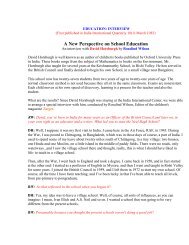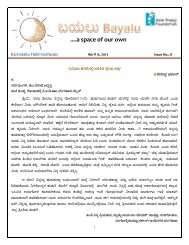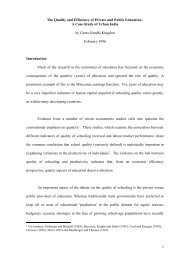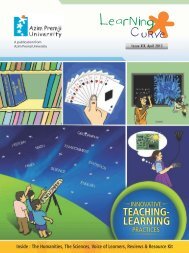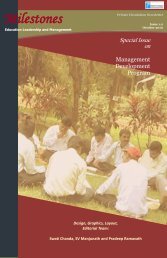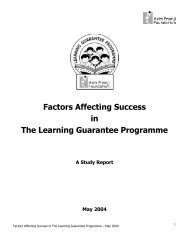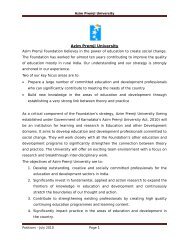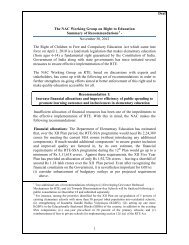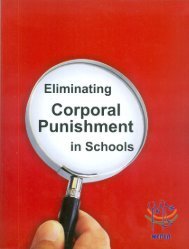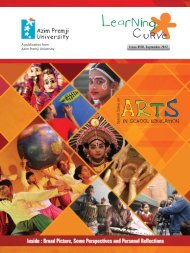Indesign Pagesnew.indd - Azim Premji Foundation
Indesign Pagesnew.indd - Azim Premji Foundation
Indesign Pagesnew.indd - Azim Premji Foundation
You also want an ePaper? Increase the reach of your titles
YUMPU automatically turns print PDFs into web optimized ePapers that Google loves.
16<br />
The Dilemma and Challenge of School Economics<br />
Arvind Sardana<br />
It is still contested whether economics should be taught<br />
at the school level. Many people feel that economics as<br />
a special subject similar to math, history or geography<br />
does not merit a place in the curriculum. The school<br />
curriculum ought to retain its focus on the development of<br />
basic abilities and skills. They feel that the time diverted<br />
to teaching economics could be better utilized in acquiring<br />
skills like math and language and to attain a mastery over<br />
them. Others feel that economics has much to contribute<br />
to understanding the modern world and this should be a<br />
part of a citizen’s training. Besides, it also contributes to<br />
the training in logical reasoning. The critiques however<br />
add that the abstraction of the economic models and their<br />
slippery ground of assumptions are not appropriate for<br />
school level introduction. There’s a grain of truth on either<br />
side. Therefore, what should be debated is the nature of<br />
economics for schools.<br />
Upper Primary Stage<br />
When Eklavya developed social science textbooks for<br />
the Upper Primary Stage (UPS) economics fi gured as<br />
a component of the civics syllabus. This inclusion was<br />
based on the understanding that all students should have<br />
the opportunity to acquire basic principles necessary for<br />
elementary economic and social understanding. There were<br />
many themes that could draw upon the economic discipline<br />
to illumine aspects of social and economic life. The mandate,<br />
however, was not to teach economics as such.<br />
It is still contested whether economics<br />
should be taught at the school level. Many<br />
people feel that economics as a special subject<br />
similar to math, history or geography does<br />
not merit a place in the curriculum.<br />
This understanding emerged out of trials & discussions with<br />
resource people and coming to grips with the approach to<br />
social sciences at the upper primary level. The book edited<br />
by Dr Poonam Batra, ‘Social Science Learning in Schools,<br />
Perspective and Challenges’ documents many chapters that<br />
Section B<br />
didn’t work and refl ects<br />
on this experience. The<br />
learning from this program<br />
was enriched over the years<br />
through actual teaching<br />
and follow-up in a sample<br />
of government schools &<br />
regular teacher trainings.<br />
The NCF 2005 debated the purpose of the civics course, which<br />
according to the earlier Yashpal Committee report (1992-<br />
93) had been reduced to teaching meaningless rituals and<br />
still exhibited the colonial framework of converting people<br />
into “loyal citizens”. The new conceptualization emerging<br />
from these deliberations attempts to break away from this<br />
tradition. Civics has been renamed as social and political Life<br />
at the UPS (and political science in higher grades). Civics in<br />
the new avatar of social and political life has within it many<br />
topics from sociology, gender, media and subaltern studies<br />
as also economics. The economics component of “Social and<br />
Political Life” textbooks, though small, is signifi cant.<br />
In the new NCERT textbook for class 6, students are<br />
introduced to a variety of livelihoods in the rural and urban<br />
areas. The diversity of contexts are then meaningfully used<br />
to draw distinction between farm and non-farm activities,<br />
farmers and laborers, self-employed and wage-employed,<br />
formal and informal workers and also discuss issues such as<br />
dearth of work, differing terms and conditions of work, etc.<br />
The next two years of UPS are devoted to understanding<br />
the two major organizing principles of our economy, markets<br />
and the government, in a contemporary setting. Beginning<br />
with the physical notion of market as a place of exchange<br />
(example of ‘haat’, ‘mandi’, local shops, mall), the unit on<br />
markets goes on to discuss how markets function both in<br />
terms of connecting distant producers and buyers on the<br />
one hand and also creating vastly different opportunities for<br />
them.<br />
The discussion on government in grade VIII takes cognizance<br />
of government failure in some of the important roles that<br />
it is supposed to take on such as universal provision of<br />
public facilities and regulation of economic activities, while<br />
emphasizing that these are roles it is constitutionally bound<br />
to honor – in order to achieve a decent quality of life for<br />
all.<br />
Pg No: 75



